Politics & Government
2023 Election: Lehi City Council Candidate profiles
Published
2 years agoon
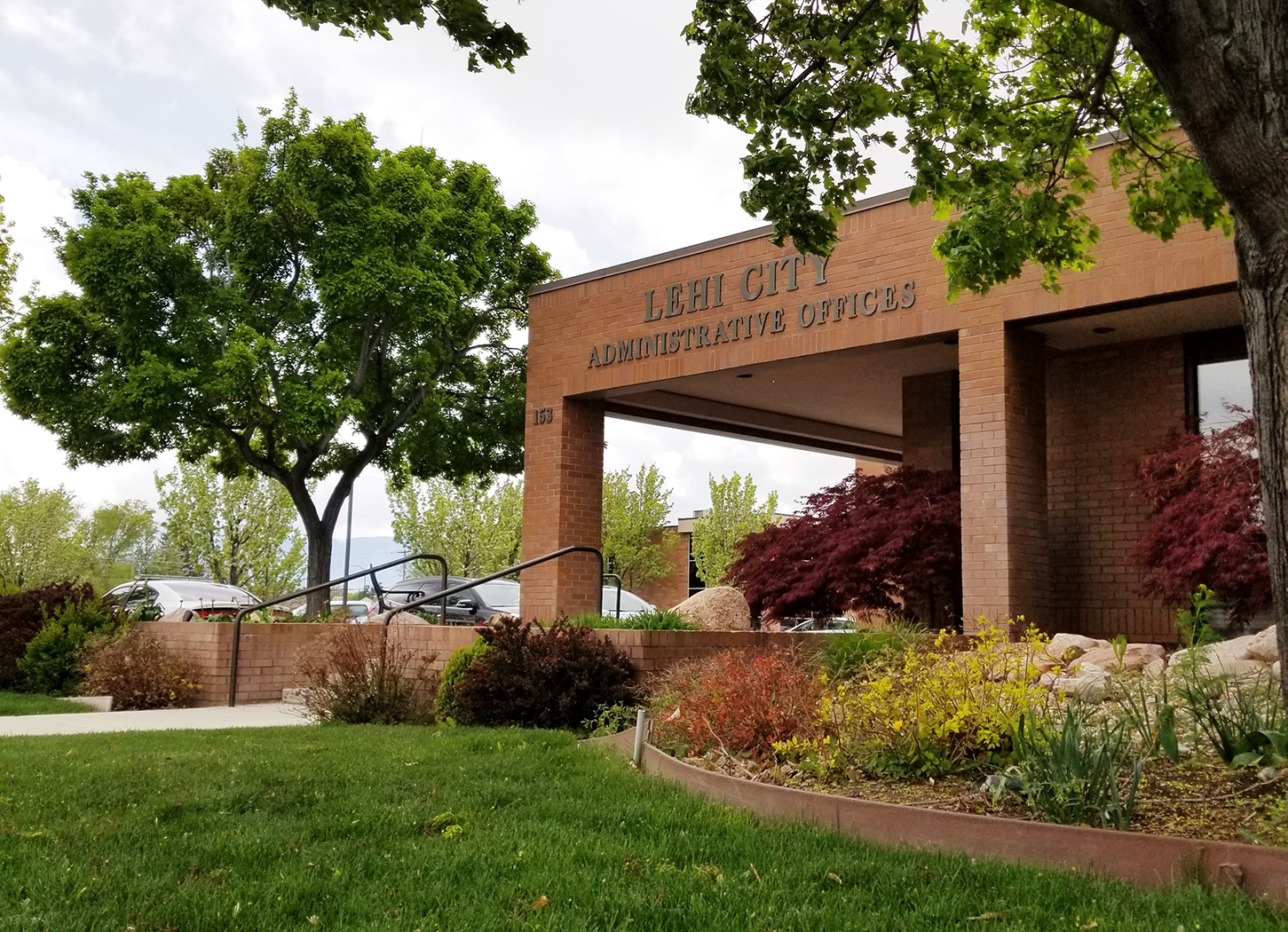
Primary Election ballots will be hitting voter mailboxes in just a few days. Lehi voters will choose from the largest candidate list in its long history, with 17 candidates vying for three City Council seats. The City has chosen to use ranked choice voting, which means voters will rank each candidate in preferred order from top to bottom. Voters may rank as few or as many candidates as they would like.
The primary election on September 5 will whittle the candidate field down to the top six heading into November’s general election. Stay tuned for more election coverage and a Lehi Free Press candidate debate on August 17 in the Broadbent Room at 7 p.m.
We asked each of the candidates to answer the following questions.
*R. Curtis Payne, Jason Harris, Taylor Frost, Rachel Barnes, and Brent Summers did not respond to multiple requests for answers to questions.
Why are you running, and what do you think is Lehi’s top issue?
Jeremy Baker: Knowing that local elected officials can significantly impact the everyday lives of ourselves and our neighbors, I thought it would be a good opportunity to bring my thoughts and perspectives as part of the city council to address the issues we have with growth. The city transportation infrastructure and parks have not kept up with higher population and density. To not burden the current residents of Lehi, I would ensure that our impact fees are appropriate to meet the added demand from higher density. I favor permitting zoning changes for any landowner who requests it, assuming they pay the appropriate impact fees. Individual liberty needs to be championed in the most impactful area of our lives–local governments. Local governments should be extremely transparent and limit their intrusion into residents’ lives, which includes being open to landowners changing their zoning. I’m happy for the opportunity to step up as an option for the city council, and I hope to earn your vote among all the other candidates to be a champion for local liberty on the city council.
Charlie Tautuaa: Having served my Country, State, and City in a military and law enforcement capacity, I have seen a lot ofinjustice, not only in the justice system but in our municipalities and what America once stood for. The misuse of taxpayer money and the forgotten generations of our City have degraded the ability of our government system to prioritize what is most important, its people. I have walked a mile in the shoes of those in my community and understand life from their perspectives. From low income to multiple jobs, from understanding prisoners to fearing for the safety of those around me, and from being served to serving, in every case, “No one should be left behind.”
“No one gets left behind” is an echo of who we are as superior species. It means “family,” whether in the Disney version or military expectation, which is why I am joining the political fray. We pay our dues to Uncle Sam, but our voices remain silenced by our financial status, our education, our employment, and even our gender and ethnicity, not because we don’t care about what is happening around us but because we are being overlooked and forgotten. Justice needs to be served ethically, taxes are for the community’s citizens, education is a right, not a burden, laws should equal freedom, and life remains unalienated. That is “Liberty & Justice” for all, not just the rich, businesses, the educated, politicians, or the able bodies. It is Liberty and Justice for all.
Jason Hill: As cities grow, they tend to increase codes, ordinances, and laws until everyone is a criminal all the time. Alexander Hamilton once wrote that the disease our governments are most susceptible to is an excess of law-making. That was in 1788; he had no idea what an excess of law-making was. Another wise man once said that a better way is to teachpeople correct principles and let them govern themselves. My primary reason for running for city council is to constrain city statutes. Any individual law may seem reasonable in isolation, but no single raindrop thinks that it’s the cause of the flood. American citizens are drowning in a deluge of municipal, state, and federal laws and regulations. And just in case the legislative bodies and regulatory agencies overlook something, we have an ocean of judicial case law to fill the gaps. Lehi hosts six lanes of Timpanogos Highway, four at 2100 North, six at Pioneer Crossing, and I-15 at its largest extent is 12: for a total of 28 state-run high-speed commuter lanes. Like giving away free ice cream on a hot summer day, there is no number of free lanes that will satiate the cities that surround us; a different strategy is needed. We must resist UDOT and lean on our elected representatives in the Utah Legislature and the County Commission to put roads elsewhere or charge a toll to non-residents who commute through our City.
Nicole Kunze: I’m running for Lehi City Council because I love this community and am optimistic about the future. Over the last 27 years, I’ve lived in Lehi, I’ve witnessed many changes, but the hometown feeling remains the same. The culture of service here runs deep – I saw it as a reporter for the Lehi Free Press, and I see it every time I volunteer in our schools, on a committee, or at an event. I want to continue that tradition of service. I want to use my experience and skills to collaborate with Lehi citizens, the Mayor and members of the City Council, business leaders, and non-profit organizations to map out Lehi’s present and future thoughtfully. The biggest challenge facing Lehi is the pace of our growth. People want to live here, and the majority of those people are our children and grandchildren. It’s a great challenge to have. We can’t cross our fingers and hope the growth slows down or stops or pull up the bridge now that we have made it across. We must keep the quality of life in Lehi high for everyone, from the newest to the oldest residents. The City’s recently updated General Plan allows for diversity and variety. The City Council will need to work together to make quick but still thoughtful decisions when proposed amendments to the plan arise.
Heather Newall: I love Lehi and want to be part of the solutions to our issues. I am passionate about service and giving back to the community. As a resident of 21 years, I am invested in how Lehi grows, our safety, and our quality of life. Our challenge in Lehi is growth and the infrastructure to support it. The solution is minimizing impact and anticipating and adjusting to what the cities surrounding us are doing. Property owners have constitutional rights to develop, and I support their rights and community rights to plan and zone. I value balanced development. As we grow, we must keep infrastructure improvements in step with the build-out of residential areas. By utilizing density triggers for traffic mitigation and building parks, we will decrease impact and provide parks and amenities to residents during build-out, not after. As a Lehi Planning Commissioner, I have shown that I value thoughtful development. A few examples include recommending doubling the open space requirements of planned developments, utilizing traffic triggers, and limiting general plan amendments (zoning changes) to twice a year, which will help the public stay informed and allow the city leadership to use a holistic approachto zoning. I pushed for 20ft minimum driveway lengths and increased parking spaces in planned communities. I have voted against developments that request parking reductions. We can’t stop growth, but we can do it right.
Corey Astill: My passion for working for the residents of Lehi and Lehi’s future is driven by dealing with red tape and bureaucracy in my career, working with many of America’s leading companies, federal and state governments, and agencies at every level. The bureaucracy is stifling to individuals and businesses, it hinders innovation, and quite frankly, lacks common sense. I want to use my experience where one person can make a meaningful difference – working to make Lehi the best it can be for all of us as we deal with the opportunities and challenges ahead. My experience working to bring a wide variety of interests together to find a path forward, even where there is serious disagreement, will help our community make wise decisions and fight for Lehi residents. Top challenges? Growth and infrastructure. Main Street, 2100 North, and Pioneer Crossing are seemingly always at a standstill. The vast majority of those drivers don’t live in Lehi. They use Lehi’s thoroughfares to get to work, sports practice, the post office, the gym, etc.Adding to the burden on Lehi’s infrastructure is an explosion of higher density out West. The State and County have responsibility for these crucial roads, but we need city councilmembers who know how to work with the Legislature, County, UDOT, businesses, and neighboring cities to solve these problems in a way that best serves Lehi residents. We need to think and plan. We must be proactive, not reactive, in preserving our quality-of-life as we manage growth.
Tyler Linday: As a libertarian running for City Council in Lehi, I am driven by a strong belief in individual freedom, limited government, and personal responsibility. I see the top challenge facing Lehi as the need to strike a balance between responsible development and preserving our community’s unique character. Our City is experiencing rapid growth, and it is crucial to ensure that this growth respects property rights and promotes voluntary cooperation while safeguarding our local heritage and natural resources.
Casey Glade: If you approve of the current city government’s loophole leadership style, then you can stop reading my answers and skip my bio as I’m not the candidate for you. Besides that, I’ll admittedly be a terrible politician. We’re probably not going to be best friends and I don’t want to kiss your baby. For anyone looking for common sense to make a comeback in 2023 then I’ll be a reliable vote for you, your family and neighborhood. This election is more than just for three City Councilmembers, it’s about creating a check and a balance within City government. Mayor Johnson has been in city leadership for 26+ years, the two remaining City Councilmembers have been here a decade. Paige Albrecht is running for reelection so she can get to 12 years in city leadership. We’ve had the same people making the decisions in this City for a long, long time. We need new representation to bring common sense and balance to the system. It’s unhealthy to leave the same group of people in power for long periods of time. Lehi needs 3 new city councilmembers that are not affiliated with current city leadership or handpicked by the Mayor. We particularly need more representation from the west side of the City where I live and where development is impacting our daily lives. We need City Council Members that care about residents as much as they care about developers. I’ll say it out loud, it’s okay to care about current Lehi residents and businesses.
Michelle Stallings: The top challenge facing Lehi is undeniably growth, and that challenge isn’t going away anytime soon. Our current city council has approved areas of ultra-high density in their new general plan that will put more pressure on our already over-burdened infrastructure– roads, water, energy, and schools. To deal with this growth, we need a change in the type of thinking that got us into this situation to a type of thinking that can plan a way out. I am running because I would like to help provide ways to better manage growth while safeguarding a good quality of life for residents. Too often I have seen the council so focused on building the City that they’ve forgotten the people who live here. I want to change that. You have made Lehi your home, and your voice deserves to be heard. I’m running for city council because I want to protect the property rights of all property owners. I will say no to development that doesn’t make sense, that negatively impacts surrounding neighborhoods, or that creates unsafe situations. I will hold developers to the requirements of the development code. I’m running for city council because I believe that as we work though our growing pains, we also need to focus on maintaining a good quality of life for the residents who live here now and in the future. We need to remember that even in a growing city like ours, people matter.
Ken Roberts: I am running for city council because of my love for the City and the opportunities that Lehi is facing for the future. I believe the potential for Lehi remains high and providing a great place for all citizens to live and raise our families is important.
Our top challenge is the growth that we are experiencing. Growth encompasses many areas, such as transportation, city services, land use and amenities.
Paige Albrecht: I’m running for City Council because I want to make a positive impact on my hometown, now and for generations to come, honoring our unique heritage while building a bright future. Our rapid growth is the top challenge we face, simply because it is influencing nearly every aspect of our community. We’re facing infrastructure strain, environmental impacts, and higher demands on public services, transportation, and education. We can answer these challenges through high levels of community engagement and wise planning. Lehi is at a crossroads (both figuratively and literally) in Utah, making growth inevitable, but there are also many potential benefits. Among cities our size, we are blessed with tremendous economic opportunity and growing diversity. This is a pivotal moment, when we can invest in infrastructure improvements, technological advancements, and top-notch city services and amenities for the future. Lehi needs sensible development and steady leadership to build a resilient and prosperous community together.
Haley Sousa: The top challenge facing Lehi is retaining small-town charm while continuing to grow. I’m running for City Council to advocate for wise policy decisions, so our children can raise theirs in a charming community with a strong economy. Continued growth increases city revenue, improves employment opportunities, and expands options for food, entertainment and services. However, growth can also strain infrastructure, increase traffic congestion and reduce access to safety services. We can lessen the negative effects of growth by requiring each new development to contribute equally to Lehi’s overall wellbeing. As population increases, so too must the number of fire, paramedic and police resources and personnel. New neighborhoods should come equipped with fiber internet, irrigation metering, open spaces and recreational opportunities. Every planning proposal should identify and be required to implement a range of strategies to minimize traffic congestion. And each new housing project should provide mixed income housing so our children can afford to buy a home near the one they grew up in. By requiring expansion to be fully financed, Lehi can successfully balance sustainable growth and small-town charm.
2. What has been your community involvement or experience to prepare you for the role of City Councilor?
Jeremy Baker: Working in cybersecurity, I regularly work with business leaders and executives to advise them on decisions that range in topics. Cybersecurity knowledge has become a near essential skill needed on any kind of board or administration. With the City growing and being within Silicon Slopes, I see the need to have a city councilor that is very familiar with the technology sector and the risks that may come with it. City services have increasingly gone online with utility payments and information, those need to be secured and the best way to ensure security is to have an advocate on the council. Regardless of whether I make it through the primary and the general election to be a city councilor, I plan to make Lehi my long-term home and will be more than willing to help the Mayor or council if they have any cybersecurity questions.
Charlie Tautuaa: Military service, law enforcement services, working with the youth, working in healthcare assisted living, educating the community in the safe handling and use of firearms as an instructor, and educating community youth on Lifesavers BLS as a certified Instructor. Cleaning trash at local parks. Public Notary and more.
Jason Hill: As an active member of the Utah County Republican Party, I have served as a delegate since 2010. I am currently the vice chair for my neighborhood precinct.
Nicole Kunze: As a reporter for the Lehi Free Press, I watched and wrote about every Lehi City Planning Commission meeting from October 2018 to November 2022, which provided a great education on the way city governance works. I am the chair of the Lehi PARC (Parks, Arts, Recreation and Culture) Tax Advisory Committee – we listen to grant proposals from Lehi-based non-profit organizations and make a recommendation to the City Council on how much money to give those organizations from the 30% of the PARC Tax funds allocated for Arts and Culture. I served on the Lehi Elementary School Community Council for four years, two years as chair. Since 2018 I have served as judge chair on the Miss Lehi’s Teen Committee. I am on the board, and I volunteer with the Lehi Historical Society. I served on the Parks, Trails and Trees Committee from April 2020 to January 2022.
Heather Newall: I currently serve as Chair of the Lehi Planning Commission. For years before that appointment, I regularly attended council and commission meetings, studied the code, and stayed informed and in communication with city leaders and staff. Through this involvement, I became a resource for my community and neighborhood, and that dedication led to my appointment to serve on the Planning Commission. I have also volunteered in schools, helping in the classrooms, fundraising, and extensive involvement in the performing arts programs. I am the Volunteer Marketing Director and Lead Parent Volunteer for Skyridge Theatre, overseeing and managing marketing, publicity, and strategy. Professionally I am the Chief Technology Officer for a non-profit organization. I am responsible for the foundation’s overall technology strategy and direction and oversee and execute the technological strategies, innovations, and vision. I have over 25 years of experience in web technology and management.
Corey Astill: I believe involvement in the community starts with guiding our children. Coaching youth sports has been a big part of my adult life. Most recently, I’ve coached Lehi boysbantam basketball, Skyridge girls bantam basketball, Jr. Jazz boys and girls basketball, Lehi City league baseball, and Super league baseball. In prior years I’ve coached travel basketball, flag football, and even soccer! It’s been more seasons than I can count. I love (almost) every minute of it and believe interacting with kids in our community is critical to our future success. I serve on the Utah Governors Working Group on Government Efficiency and Cooperation, where business and government collaborate on how to streamline regulations and licensing to give adequate protection to citizens while fostering innovation and unleashing engines of our economy. I’ve attended many Lehi City Council meetings and watched many more on the video feed (thank you, technology). I brought my teenagers to volunteer taking tickets at the Lehi Rodeo during Round Up, and I’ve volunteered as a judge for Skyridge HS Debate. I’ve been involved in the Utah County Republican Party and serve as Chair for Legislative District 51, located on the West side of Lehi and Saratoga Springs. I’ve hosted a meeting where over 60 people attended, to have state elected officials give Lehi residents an overview of this year’s legislative session and answer questions. I’ve been a delegate and volunteer in my precinct in Holbrook Farms, served as Chair of Credentialing for the Utah County Republican Convention Committee, and was co-Chair of Elections for the Utah State Republican Convention. I’m proud of my membership and activity in the Chamber of Commerce for Lehi, known as the Point of the Mountain Chamber, working with local businesses to make our economic community great. It’s been good to see Mayor Johnson and Lehi City administration at these events and it is important for city officials to be engaged in building a thriving business community. Maybe my most meaningful work in the community is a project with my wife Eileen, as we recently opened a center to provide behavioral health services for children with autism. Our center, Success on the Spectrum offers ABA therapy and parent training to help these amazing kids become productive and fulfilled adults in mainstream society.
Tyler Linday: My community involvement and experience align with libertarian principles, which emphasize voluntary participation and grassroots initiatives. I had the opportunity to intern for my hometown’s city government during college. I have actively engaged with local organizations and volunteered my time to support community-driven projects and events in the past. These experiences have honed my understanding of the importance of individual empowerment and community collaboration. I am relatively new to Lehi, and look forward to years of engagement with our community, especially as my infant children grow-up and learn here.
Casey Glade: Besides attending several city council meetings, city planning meetings and meeting one on one with the Mayor, city administrators and 4 out of 5 city councilmembers, I’ve coached many soccer seasons (hundreds of games), volunteered with my church and regularly ride with the Lehi mountain bike team. Additionally, I’ve run a small business for 18 years, have an MBA and 3 bachelor’s degrees. More importantly, I have a wife and 3 amazing teens I love to death. Lehi is the only City my kids have called home and I want them to love it as much as I and many other residents do. It’s important to note that I have never “served” in any city leadership position. I recently heard a person tell candidates that previous city leadership was one of her biggest requirements of a City Councilmember. That may be true in many situations, but not being part of city leadership (Councilwoman, Parks Committee, Planning Commission, etc.) is a huge plus in this particular election. I do not believe city leadership should be some sort of government steppingstone to higher office. Those that seek long-term employment within city leadership should be looked at through a very skeptical lens. Loophole leadership happens when you have a small group of people in power for long periods of time.
Michelle Stallings: I appreciate the willingness of all seventeen candidates to serve on the city council. But being willing to serve is only one part, a candidate must also be able to serve. My experience and long-time community involvement have helped prepare me in unique ways to serve the people of Lehi. My service as legislative vice president for our parent-teacher association provided me with training and experience reading legislation and state code, tracking bills, working with state legislators and local officials, and advocating for safety, education, and other important issues. Serving on Lehi City’s Form of Government committee gave me the opportunity to visit other cities, study various forms of municipal government, understand the dynamics among mayors, council members, city administrators, and city managers. In this and other capacities, I gained experience presenting before the city council and state legislative committees. As a result of my efforts and the efforts of others, state laws have been changed for the better. Experience I’ve gained in less formal roles also sets me apart from other candidates. As a classical educator and mom, I will bring logic and sound reasoning as well as considerate understanding and common sense to the decision-making process. As an active and engaged citizen, I understand the history, the process, the issues, and the development code. I’ve attended city council and planning commission meetings long before any other city council candidate, incumbent included. I did not attend because I enjoyed meetings or to network. I attended as a concerned citizen, advocating for safe neighborhoods, fiscal restraint, better management of growth, and voter rights. A complete and thorough understanding of an issue is essential for good decision making, and my record shows I study issues thoroughly. When the PARC tax was a ballot issue, I came across important requirements in state code the city finance director had overlooked. When the city council first discussed ranked-choice voting, I requested and studied the data from a presentation by city staff which showed ranked choice voting denies some voters the right to have a vote in each open seat. I read state code regarding ranked choice voting methodology. The rights of individual voters are important to me, and because ranked choice voting in multi-seat races denies voters the right to full and equal voting power, I have consistently spoken against it before the city council. I was one of the few to speak against it in the beginning, but one of manyto oppose it when the city council voted to use it again this election. I will continue to advocate for a return to our traditional one person, one vote system. I study issues thoroughly. I have a good understanding of city government. My record shows I am both willing and able to serve the people of Lehi.
Ken Roberts: I have been on the Environmental Sustainability Committee for 3 years. We work to educate our citizens on recycling, air quality and water. I have also served on the board for the Food and Care Coalition in Provo. We focused our efforts on providing a way for the homeless to find shelter and transition to a long-term housing solution. I serve on the board of Heart 2 Home; a non-profit helping families and individuals improve their living conditions. I also served on the School Community Councils for Lehi Junior High and Skyridge High School.
Paige Albrecht: I’ve worn many career hats, from Special Education teacher in Alpine School District to social work through the Utah Parent Center. These different perspectives come in handy often on the Council and have taught me the importance of serving and investing in the community. I’ve volunteered on the Lehi Round Up Celebration Committee, the Parks Trails and Trees Committee, and twelve years on the Lehi Arts Council. As part of City Council, I’ve also served as liaison for the Library Board, Jordan River Commission, and Lehi Youth Council. I was on the Board of Adjustments for a year, three years on the Lehi Planning Commission, and of course, I’ve served on the City Council. Lastly, over the past three years I earned my master’s degree in public service from UVU to learn more about effective local government.
Haley Sousa: I have been preparing for the role of City Councilor for the last decade through a career in public service. I currently serve the state of Utah by working to ensure its citizens have access to a safe, clean environment. As an Assistant Attorney General representing the Department of Environmental Quality, I regularly work with a range of stakeholders with competing interests. I excel at building consensus, a skill imperative for any council member. I search for creative solutions to tough problems. I work closely with laws related to open and public meetings as well as access to government records, so I am confident that sunshine is the best disinfectant. I’m a committed public servant, and extending my service to the citizens of Lehi is a natural progression. My background in government would allow for a smooth and seamless transition into the role.
3. What service, process or law would you like to see implemented or improved in the City?
Jeremy Baker: I would like to change the way park proposals are created to require each to have phases where the first phase is the basic park that can be used and prepped for additional phases, then permit residents to donate directly to parts of each phase of the park’s development. Ideally a funding tracker is provided on the Lehi city website to show residents directly how park development funding is going.
Charlie Tautuaa: a. Animal sanctuary for runaway pets and wildlife. We are growing at a rapid rate, destroying animal habitats. There are fireworks year-round causing animal life to scurry. If we are causing a disruption in the natural order of habitation, then we need to cater to its existence.
b. An increase in the size of the Lehi Recreation [Legacy] Center to cater to the overcrowding population.
c. Adjustments to the roadways to support a higher flow of traffic.
d. Increased support to lower-income families and locally owned businesses, not corporations.
e. Decrease the misuse of taxpayer money to prioritize needed services.
f. Build stronger bonds between UDOT, ASD, and Lehi Municipality
g. Utilization of unused land for the growth of communities
h. Establishment of a Lehi Waste Management
i. Self-sustaining City that is not dependent on State entities.
Jason Hill: I would like to see fewer laws. Thomas Jefferson said, “The natural progress of things is for liberty to yield, and government to gain ground.” The more you ask the City to do for you, the less liberty you will have. In 2016 the voters of Lehi decidedly rejected a massive $50 million dollar park bond. Public parks beautify our City and enrich our lives. The City can ease the park burden on the taxpayer by soliciting financial donations from Lehi residents who can afford to contribute. When our pioneer ancestors wanted to build something, they would organize the community to do it. Lehi still has a great volunteer spirit. Community volunteers can lay sod, build gazebos, make trails and install playgrounds. We can all be a part of the solution.
Nicole Kunze: Lehi City does a great job of staying in touch with citizens who engage online, but not every resident is on social media. We can improve communication with those who aren’t online, especially dates for construction jobs that will affect access to their homes and streets.
Heather Newall: The Alpine School District anticipates putting a district split on the 2024 ballot. As such, Lehi must study and consider our placement in a new district based on feasibility studies we can trust. We must go through the process to determine the best solution for Lehi and our citizens. It costs more to live in Lehi than it costs to live in other areas in the district, but because of that, we have high property tax revenues. We have a prosperous economy with incredible commercial businesses. Part of the cost of living in Lehi should not be subsidizing other cities. I’m concerned about being part of a school district where we struggle to pass needed bonds because we are at the mercy of other cities with larger populations. I also want to be sure we are cost-effective and consider all aspects of the split, from administrative overhead to bonds to what our surplus or deficit funding would be in a new district. Our teachers and school employees should have the same or better compensation. We need answers to many questions, which will take thoughtful, considerate, and unbiased city leadership to determine the best solution for Lehi.
Corey Astill: My expertise and what I care about most is solving problems. We need a resident driven vision for Lehi. What do we want the City to look like in 10, 15, 20 years? We need to look ahead and recognize how our choices about zoning and transportation will affect what Lehi becomes in the coming years. I work with large businesses to help them grow and succeed in a complex world of rules and regulations and changing laws. We deal with issues like infrastructure and roads, sensible taxation, and minimal, smart regulation. We’re constantly working to untangle difficult public policy problems, searching for consensus among a wide variety of large companies that are used to doing business their own way. It’s my job to thread the needle and find a path forward that everyone can agree on. That’s almost never easy. Often these companies disagree among themselves. What matters is that we find a way to move the ball in the right direction, even if it’s only incremental. The future of Lehi doesn’t just depend on what we do in our City, we must work with other cities, agencies, and governments to fight for the vision Lehi residents want for their City. All along the way, we need to work together toward achieving our larger vision for the City. That takes actively engaging residents, careful planning, and deliberate choices about zoning and infrastructure.
Tyler Linday: One service I would like to see improved is the streamlining of the permitting and zoning processes. Excessive bureaucracy can hinder small businesses and homeowners from pursuing their ambitions and making improvements to their properties. By simplifying and reducing unnecessary regulations, we can foster entrepreneurship and create a more vibrant local economy.
Casey Glade: It shouldn’t take a resident hours and hours per week (a part-time job) to follow what is going on in the City that could impact their community. The reality is difficult to hear, but current city leadership does not like to hear from the public. Your views and opinions just get in the way of their important Lehi City Corporation business. I was recently in a planning commission meeting where dozens of people from the Thanksgiving Village community came to speak out against a major 2,000-unit high density development the City is pushing through. They spoke with passion and common sense. Unfortunately for them the City had already passed other items pertaining to this property. Their comments were unilaterally disregarded (I don’t blame the Planning Commission; this is on the Mayor and City Council for the project getting this far) and the motion was passed as if they didn’t even make a comment. It’s true residents were late to the game, but Lehi City leadership should do better about informing the public of such dramatic changes. If you miss a meeting, a motion, or some minor footnote you will lose your community voice. City leadership counts on that happening as the complex and time-consuming process of city procedures goes against the needs of you and your family. The City, along with developers, can wait you out, table a discussion if you show up, then put it on another agenda and hope you miss seeing it put on the new agenda. This is loophole leadership in action. Residents shouldn’t be left questioning city councilmembers’ decisions. Generally speaking, city government should not be looking for loopholes or procedural victories, but for ways to be more transparent. We don’t need centralized planning or decision making. Instead, we should look for ways to push decisions to the edges, closer to the people, even if it is a bit messy and the City doesn’t get its way.
Michelle Stallings: Aside from the obvious –improving road design and planning, providing safe walking routes to schools, and providing and maintain city parks- I would like for the City to adopt an equal and fair election process that protects the rights of all voters. Because the city council passed a resolution to use ranked choice voting for the primary and general elections, I know it’s too late to change our election process for this election cycle. In the future, however, I would like to see the City end its experiment with ranked-choice voting and return to our traditional, straight-forward method of voting where each person is guaranteed the right to have a vote for each open seat. It’s been clearly shown that ranked choice voting in a multi-seat race does not allow a portion of voters the right to have a vote counted for a candidate for each open seat. In the 2021 Lehi City election for example, 1,376 voters had one vote counted for two seats. To allow some voters the right to have a say in each seat, but not others, is unfair and, in my view, unconstitutional. In addition, to these concerns, the ballot is lengthy and overly complex. I’m concerned that some voters will be so intimidated by the complexity of the ballot, they will simply not vote. Others may unintentionally spoil their ballots because of the size of the field to be filled out. Your vote matters. We need to end this failed experiment, stop playing games with elections, and return to our traditional election process. Three seats, three votes- fair and simple.
Ken Roberts: I would like to see our access to alternate forms of transportation improved by encouraging accessibility for all citizens via buses, trains, bicycles or walking. We need a diverse range of solutions by looking at a combination of using all forms of transportation possibilities.
Paige Albrecht: As part of my master’s program, I did two projects that focused on services that I’d like to see improved in Lehi. First, I evaluated the code enforcement practices and procedures of comparable nearby communities and used what I learned to advocate for a dedicated code enforcement officer to be hired in Lehi. I was happy to see it included in this year’s budget and I’m excited to watch the outcome. Next, I did my capstone project on the need for a comprehensive updated Emergency Management Plan in Lehi. We’ve outgrown the old one, and it’s the sort of thing that is often delayed or ignored until it’s too late. We were blessed and lucky to avoid serious damage during flood season this year, but I don’t want us to be caught vulnerable if other disasters strike.
Haley Sousa: I’d like the City to improve processes for public participation and engagement. Reaching a broader range of people will better inform policy and will allow decision-makers to better understand the needs and priorities of Lehi citizens. Lehi has implemented many tools to engage the public, like EngageLehi.org, the monthly utility bill newsletter, and a Facebook page. While commendable, these are not enough. I’d like the City to continuously evaluate and improve processes to reach those without good internet access or a social media presence. The City’s current engagement processes favor the outspoken, but the quiet voices also have important input to provide.
4. If you could make any one change to the City Budget, what would it be?
Jeremy Baker: Reviewing the percentages utilized for various services, I would increase the percentage that goes towards park development.
Charlie Tautuaa: Consolidation of several departments in the budget, to decrease unnecessary use of tax funds and centralize budgets on vital needs of the community as a whole.
Jason Hill: I’m skeptical of the need to spend $20 million dollars on a new city hall. Residents who live in the Thanksgiving Point area near 2100 North struggle to enter and exit their neighborhoods during rush hour. This is a safety issue which should have been addressed before spending money on a new home for the city government.
Nicole Kunze: After reading Lehi City’s budget as well as the budgets of three other Utah cities similar in size, I’m happy with the way Mayor Johnson (and the City Council) have prioritized Lehi’s funds.
Heather Newall: I’d like to see the Legacy Center subsidy decreased. This last year we budgeted nearly $2M to subsidize the Legacy Center. We also drastically increased the cost of membership for non-Lehi residents. I believe this will pressure surrounding cities to provide a recreation center for their citizens but not have the significant impact we need on our Legacy Center’s profitability. It would be worth studying and surveying citizens to discover ways we can narrow the gap of subsidizing. $2M a year could go far in helping us build out our over 230 acres of regional park space, especially when we consider $2M is the same amount it would cost to build the Dry Creek Reservoir out to the level of Tibble Fork in American Fork Canyon.
Corey Astill: We don’t have infinite resources. As a member of the Lehi City Council, I will prioritize transportation and infrastructure needs; I will ensure that our law enforcement and first responders have the resources they need; I will look to expand our parks, ball fields, and green spaces; and I will never forget that every dollar the City spends is not just taxpayer dollars in general, they are dollars out of your individual budget. City leadership has an obligation to be prudent and responsible stewards of your tax dollars.
Tyler Linday: If given the opportunity to make one change to the City Budget, I would prioritize reducing government spending and lowering taxes. As a libertarian, I firmly believe in fiscal responsibility and the idea that individuals are best equipped to manage their resources. By cutting unnecessary expenses and promoting a leaner government, we can leave more money in the hands of our hardworking citizens to invest in their families, businesses, and personal goals.
Casey Glade: In general, I’ll admit I lack a lot of insights and details about the city budget. With that said I’ll speak generally. Government at all levels should be required to always do more with less. More government and bureaucracy are rarely the answer to societal ills. My view is that limited government with a limited ability to spend tax dollars is preferable than larger governments and larger bureaucracies.
In the past 12 months the city council has:
– Approved $22M new city hall construction budget. What kind of Taj Mahal are we building or are we in some sort of city competition residents are not aware of? Seems rather extreme, but a new city hall is just the first phase so there’s more debt to come.
– Approved $70M for Strata Networks to install fiber internet tosome parts of the City.
Just these 2 decisions alone created over $1,000 debt for each of our 90,000 men, women and children in Lehi. This is just a tiny tip of the iceberg, but it’s fair to say I’d be on the other end of these decisions asking hard questions about doing more with less.
Michelle Stallings: I would like to make many changes to the city budget- more money for sidewalks and safe pedestrian crossings, less debt, and lower property taxes. If I could make only one change however, I would choose to use the $10 million designated for “park construction” for all three regional parks instead of one. I would use $1.5 million of the $10 million for paved parking, a paved road, and restrooms at Dry Creek Lake. Providing these basic features would finally allow residents to enjoy this unique city park. I would also use some of that $10 million to put in utilities at Mellor-Rhodes park, with the understanding that fill dirt would still need to be added. (It’s unfortunate that dirt removed from Dry Creek Reservoir wasn’t used for this purpose.) The rest I would put towards a more modest all-abilities playground at Peck Family Park. When voters approved the PARC tax, we were told that the money would go towards Mellor Rhodes Park. Funding for all three parks was also included in the 2022 budget. After the PARC tax was approved by voters, the council decided instead to put all the park portion of the PARC tax as well as surplus funds designated for Dry Creek towards Peck Family Park. I believe that by approving the PARC tax, voters expressed their desire for more parks. Out of respect for their wishes, I believe we ought to complete two modest parks and make progress towards a third rather than do a partial completion of one extravagant park while putting the other two parks indefinitely on hold.
Ken Roberts: I would like to see more money put towards our parks, recreation and trails. Having these amenities creates a very livable city for all of us.
Paige Albrecht: Fortunately, our budget is amended throughout the year as financial circumstances change. We allocate resources very carefully, and the revenue projections in our budget are very conservative. I anticipate (and early numbers bear out) that we will be able to fund a few more things in the months to come, and I’ll advocate for sufficient facilities to make Dry Creek Reservoir useable for boating and fishing while we wait for enough revenue to build the recreational amenities completely.
Haley Sousa: I want the city budget to fully fund equal opportunities for all Lehi families, every day of the week. I firmly believe Lehi facilities like the splash pad, the Legacy Center, and the library should be open on Sundays. As the parent of a kindergartener, my family is always looking for activities to do together. Because many places aren’t open on Sunday, it can be challenging to get out of the house and stay active. These facilities should be available to those who choose to use them. I do, however, understand the implications of opening these services on Sunday. Doing so should be done thoughtfully, and should not burden the budget or burden specific employees. I’d recommend Lehi study and implement strategies used by other similarly sized cities to make their recreation centers profitable on Sundays. I’d advocate for developing policies to ensure employee coverage was fair, to minimize or eliminate requiring those who do not work on Sundays for religious reasons from being required to. In this way, Lehi can be fair and reasonable to everyone.
5. Where in Lehi do you live?
Jeremy Baker: I live in Holbrook Farms.
Charlie Tautuaa: West of Center Street near the rodeo grounds
Jason Hill: I live in north-west Lehi.
Nicole Kunze: I live a few blocks north of downtown, about a quarter of a mile west of I-15.
Heather Newall: I live in the North-East area, south of Timpanogos Highway.
Corey Astill: I live in Holbrook Farms off 2100 North where the new pediatric hospital is being built.
Tyler Linday: I reside in the West side area of Lehi (Cold Springs Ranch)
Casey Glade: I live in the southwest side of the City.
Michelle Stallings: I live near Skyridge High School.
Ken Roberts: I live in the North-East section of town.
Paige Albrecht: A: I live in the heart of historic downtown Lehi, just north of the Police Station and near City Hall.
Haley Sousa: My husband, son and I live north of the cemetery, near the soccer complex.
*R. Curtis Payne, Jason Harris, Taylor Frost, Rachel Barnes, and Brent Summers did not respond to multiple requests for answers to questions.

You may like
-
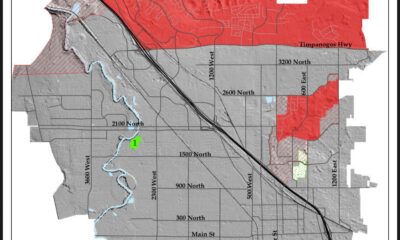

Lehi Fireworks Restrictions
-


OPINION: Proud to be from Lehi
-


Utah County steps in to solve AF Canyon restroom dilemma; staffing issues persist
-


Lehi teen’s float wins big at Lehi Parade
-


THEATRICAL REVIEW: TCT’s “Joseph and the Amazing Technicolor Dreamcoat” an uproarious take on a classic
-
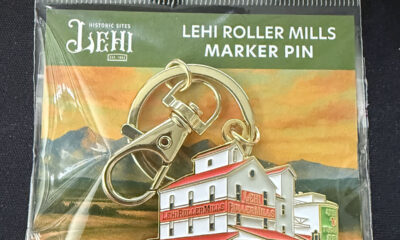

Collector marker pins capture big stories in tiny images
-
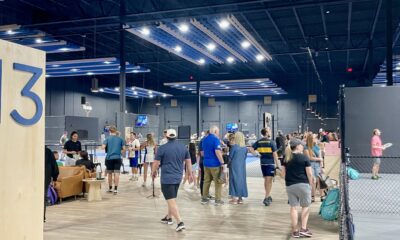

The Picklr Lehi opens Utah County’s largest indoor pickleball facility
-
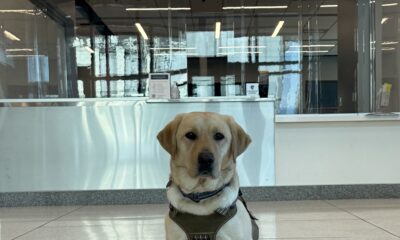

New LPD K9 detective Digi’s rare skills boost police efforts
-
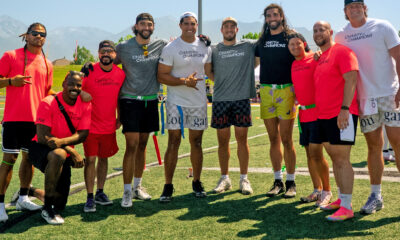

NFL players help raise funds to support local athletes with rehab
-


Lehi Round-Up week in full swing

